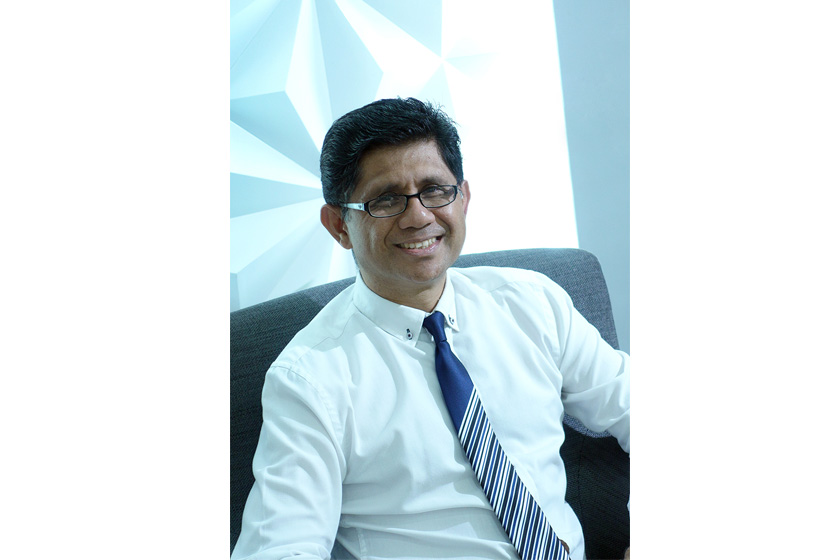Winner of the 2018 Alumni of the Year Award
Australian graduate Laode Muhammad Syarif is often in the midst of a sweeping corruption scandal thwarting Indonesia’s development.
But he can always stand tall with pride.
As one of the commissioners of Komisi Pemberantasan Korupsi (KPK), Indonesia’s highly respected anti-graft commission, Syarif is spearheading a critical war against corruption in Southeast Asia’s biggest economy.
This year, the 52-year-old has been awarded the Alumni of the Year Award, which recognises the outstanding contribution and significant impact made by alumni.
Syarif has always considered himself as merely a “catalyst” as the fight against corruption and environmental degradation is a collective effort.
Amongst his major achievements were his substantial involvement in the drafting and enactment of the 1997 Environmental Protection and Management Act, the 2016 Supreme Court Regulation on Corporate Criminal Liability, and the 2018 Presidential Regulation on Beneficial Owner.
Syarif, who has fought countless corruption scandals—often under perilous conditions—proudly cites his educational experience in Australia as something that paved the way for so many opportunities in his career.
“I was able to work with others to initiate reforms within law enforcement institutions, including the police, state attorney, and the Supreme Court,” he said.
“Long before I became a Commissioner, I was already involved at the KPK. My passion in teaching has also led me to work in Indonesia, Australia, and even in Vanuatu and China.”
Syarif spent seven years living in Australia as he pursued his graduate education.
Under an Australia Awards Scholarship (formerly the Australian Development Scholarships), he obtained his Master in Law at the Queensland University of Technology (QUT) in Brisbane in 2001, and later his PhD in Law at the University of Sydney in 2006.
“My educational experience at QUT and the University of Sydney Law School have influenced my career both as an academic, and as an environmental and anti-corruption activist,” said Syarif, adding that he met many experts from other parts of the world at the two institutions.
Reducing corruption was one of the top priorities of Indonesian President Joko Widodo when he assumed power in 2014. Many economists forecast Indonesia becoming one of the top five economies in the world by 2030. However, corruption may derail the resource-rich country from achieving its full potential. Graft has also been cited as one of the main obstacles to productivity and ease of doing business in Indonesia.
When it comes to Australian collaboration, the KPK has already worked closely with the Australian Federal Police and Attorney General’s Office. And thanks to his strong Australian connection, Syarif is very keen to bring the cooperation between the two countries even closer.
“I think anti-corruption subjects and research can be increased in the cooperation between Indonesian and Australian academia to work on issues such as good governance and anti-corruption,” said Syarif.
“Indonesia is a good place to study anti-corruption because while we still have a lot of problems, at the same time we’re quite advanced [in terms of regulation]. We can learn from Australia and at the same time Australia can learn from Indonesia, so the exchange is actually mutual.”
He has also previously worked in one of Australia’s leading centres for environmental law research and teaching, the Australian Centre for Climate and Environmental Law.
His experience in the academic field includes researching and teaching at his alma mater, Universitas Hasanuddin, in Indonesia’s eastern port city of Makassar, and teaching as a guest lecturer at the University of Sydney Law School, National University of Singapore Law School, and Cebu University Law School.
He praises the Australian university system for its research capacity and its quality assurance, which has monitored the academic standing of all state university across the country.
“They have very good standards in universities because the universities are managed by the government,” he said, adding that most institutions in Australia are well-equipped with modern technology and study support for their students.
When asked what his advice would be for new alumni looking to make a difference in Indonesia, Syarif said, “Never stop learning and widening your network to bring real changes and reforms for Indonesia, no matter how small you might think they are.”


 Laode Muhammad Syarif Stands Tall in the Fight Against Corruption in Indonesia
Laode Muhammad Syarif Stands Tall in the Fight Against Corruption in Indonesia
